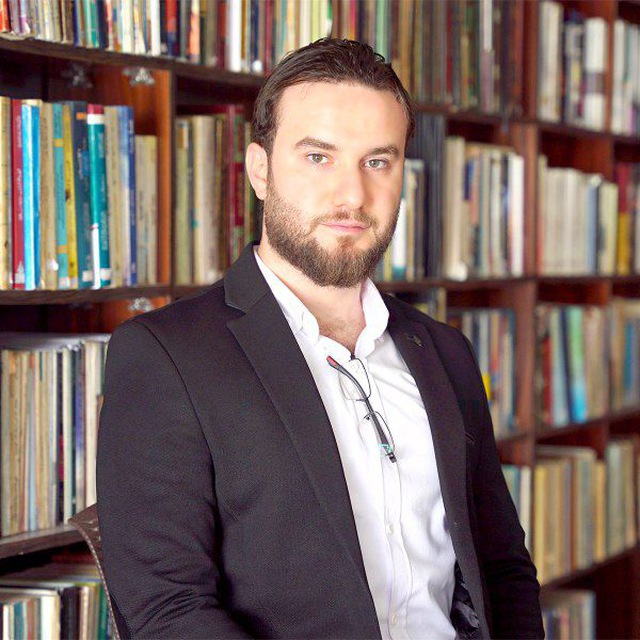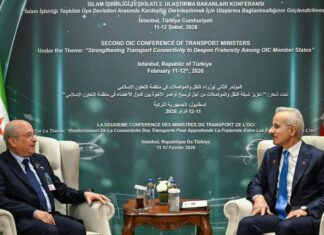An Interview with Nouruddin Al-Baba, Damascus-based Analyst and Author
 Southern Syria is once again in the spotlight, with Israeli strikes in Daraa province, border operations, claims of temporary raids, and claims of “protection” of the Druze population raising more and more questions. What is behind these actions? Where do military objectives end and a policy of influence begin? And where does the new Syrian government fit into the equation?
Southern Syria is once again in the spotlight, with Israeli strikes in Daraa province, border operations, claims of temporary raids, and claims of “protection” of the Druze population raising more and more questions. What is behind these actions? Where do military objectives end and a policy of influence begin? And where does the new Syrian government fit into the equation?
In this interview with writer and political analyst Nouruddin Al-Baba, we look at Israel’s hidden objectives, the vulnerability of Syria’s transitional period, and possible ways to build a containment strategy. Al-Baba comments on Damascus’ current moves, the role of Turkey and Saudi Arabia, and explains why, in his opinion, Israel is not interested in peace, but only in securing its dominance – albeit in a new guise.
_______________________________
L24: To what extent will the new Syrian leadership be able to ease the burden on the Syrians to avoid clashes between Tel Aviv and Ankara or other parties? And what is the path to this?
Nouruddin al-Baba: “Undoubtedly, the new leadership in Syria has inherited a difficult legacy from the previous regime. This legacy requires many years to deal with and strong tools to counter these challenges.
“Among the most important challenges are Israeli violations and Israel’s regular aggression against Syria, which has been going on for many years and has become routine on the Israeli side. Such aggression cannot be fought with slogans alone. It requires diplomatic and political steps at the highest level.
“Among the steps taken are the efforts of President Ahmad al-Sharaa and the high level of coordination with Turkey to conclude strategic agreements in the military and security sphere, including the issue of military bases. High-level meetings are also taking place with the brotherly Kingdom of Saudi Arabia. In the future, perhaps Saudi military bases will appear in Syria as well – this issue is being seriously discussed.

“If the new Syrian leadership wants to follow a proactive policy that will protect it from Israeli strikes and aggression, preserve Syria’s sovereignty and at the same time spare the Syrian people from a new war, it should follow this path.
“However, the Israeli administration is behaving increasingly aggressively not only towards Syria, but also towards the entire Arab region, while relying on the support of the American administration. But I believe that this aggressive Israeli policy will lead to a new round of tension in the region, while the region does not need a new escalation.”
L24: Can Ankara establish relations that, even if they do not reach normalization, peace, or anything like that, will be stable enough to contain Benjamin Netanyahu and his government?
Nouruddin al-Baba: “I believe that Netanyahu and the far-right administration that rules Israel do not want such a relationship. On the contrary, they seek even greater forward momentum and escalation. These aggressive steps bring Netanyahu considerable popularity among the right, which now controls the political decisions in Israel. They help to prolong his political life and cover up his failures and corruption, both in the Gaza issue and in domestic Israeli politics.
“That is why Netanyahu does not seek relations based on, let’s say, normalization. He wants Syria and all Arab countries to be dependent and weak, he wants dominance and superiority over the Arab sphere. And this does not apply only to Syria.
“I believe that Netanyahu’s aggressive policies, which are criticized even within Israel, including by many political forces, including some right-wingers who rule today, are destroying everything. Not only the prospect of normalization, but also the very idea of peaceful coexistence.
“On the contrary, they are continuing the policy of aggression, blowing up the situation and undermining all the political achievements that Israeli governments have achieved within the framework of normalization with the Arab world.
“Thus, Netanyahu is risking what has been achieved within Israel today. This risky policy will inevitably have negative consequences for both Israel’s external security—I mean the neighboring Arab countries—and for internal stability, especially in the issue of the occupied Palestinian land.”
L24: Why is Israel striking Daraa province?
Nouruddin al-Baba: “Daraa’s proximity to the Israeli border, the presence of a large number of military installations in the province, its connection with Jordan and Lebanon, as well as its proximity to the Syrian capital Damascus, and its location on the road between Suwayda and Israel—all this makes Daraa an attractive target for Israel. Especially considering that Israel has repeatedly tried to play on the card of the Druze minority in southern Syria.
“All these factors make Daraa a preferable target—whether for establishing control over strategic heights and hills, or to carry out aggressive operations, including ground incursions, arrests, raids on military installations of the former regime, which are now under the control of the new Syrian Ministry of Defense, with the aim of destroying and weakening the country’s remaining military capabilities.

“In the past, when Israel struck Syria, the media always raised the question: ‘When will Syria respond?’ Now another question arises: is Israel testing the reaction of the new Syrian government—will it respond or not?
“Today, Syria is going through an exceptional period—it is in one of the weakest phases of its history. The country is going through a period of destruction, the reconstruction is not yet complete. This makes the current phase very convenient for Israel to expand its military actions on the ground. In addition, the new Syrian government must deal with many problems accumulated over decades, both internal and external—including the problem of Israeli incursions and repeated attacks.”
L24: You previously called this Israeli invasion and strikes on Quneitra and the Daraa region a form of military banditry. Is this only in this sense, or are there other goals?
Nouruddin al-Baba: “Israel really wants to bite off more Syrian territory—as it has already done in Quneitra and Mount Hermon. It wants to take advantage of this sensitive stage that Syria is going through to seize more Syrian lands.
“Israel’s goal is not just to protect its borders by neutralizing possible military threats from the Syrian Defense Ministry or other structures. It is pursuing territorial expansion and building new settlement projects.
“There are religious dreams that the current Israeli government is promoting, and Benjamin Netanyahu has a desire to ‘run ahead,’ postponing discussions of political issues, court cases, and corruption charges. That is why we constantly see him jumping from one front to another, from one crisis to another—because escalating tensions in the region allow him to stay in power and shirk responsibility for corruption and failures, including military ones, for example, in Gaza and the West Bank.”
L24: What options does Damascus have in this situation?
Nouruddin al-Baba: “Damascus has outlined its priorities quite clearly. The first is to solve the internal problems through which Israel penetrates into the Syrian reality. The second is to strengthen and build close ties with the regional Arab environment, especially with fraternal countries.
“Negotiations on strategic defense agreements with Turkey as a regional player have already begun. I also assume that Saudi Arabia may soon deploy its military forces on Syrian territory.
“It is necessary to rebuild the Syrian military and security structures destroyed by the previous regime. In addition, we need to develop the services and the economy, because it is through the economy and social needs that Israel is penetrating Syria, trying to attract certain groups of the population in the south of the country to make a buffer zone out of them and create an autonomous entity, separate from the central government in Damascus, that would serve the interests of Israel.”
L24: The Israelis say: “We do not seek to occupy or take over Syria, but only conduct small ground operations and then return.” Looking at Israeli actions, do you see the risk that Israel could gain a foothold or take over some areas?
Nouruddin al-Baba: “Most Israeli incursions are aimed at imposing a new reality. This reality is based on two main components.
“The first is the occupation of strategically important locations, such as in the case of Mount Hermon. These heights are commanding points and allow control over the Syrian-Lebanese and sometimes even the Jordanian border.

“The second is an attempt to attract part of the population of southern Syria to cooperate with the aim of creating a separate administration, independent from the central government in Damascus. This could be an entity based on a certain sectarian, ethnic or geographic isolation.
“Such a quasi-state enclave would be clearly linked to Israel, acting as a buffer protecting the Israeli border and realizing its interests—be it in the sphere of security, economics or military affairs.”
L24: The Israelis also claim that their actions have to do with protecting the Druze in Syria. How do you assess these statements? Is there a connection between Israeli actions and what was said earlier about the Druze in Syria?
Nouruddin al-Baba: “Israel’s strategic goal in Syria is to prevent Syria in the future from having any military capabilities that could pose a threat to it. In pursuit of this goal, Israel is playing various cards, including the Druze in southern Syria, trying to either exploit this resource or exhaust it.
“Israel’s support for the Druze in order to form an isolationist or even separatist entity is not an end in itself, but a means to an end the main goal of which is to prevent Syria from developing strategic military capabilities that could threaten it. It also seeks to create a buffer zone in southern Syria that would ensure Israel’s security.”
L24: Are there any steps that the current government in Syria should have taken but did not?
Nouruddin al-Baba: “I believe that the current Syrian government faces many challenges and problems that seriously limit its ability to act in all directions at once. However, focusing on internal stability, solving internal problems, as well as concluding strategic agreements with key regional players—primarily Turkey and Saudi Arabia—can deter Israeli incursions.”








